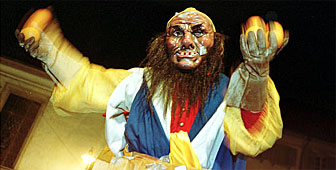Carnival time comes to Switzerland

Carnival season is underway in Switzerland. Festivities kicked off in Lucerne on "Fat Thursday" - or "Schmutzige Donnerstag", as it is known locally. In the coming days, masked figures will dance through the streets of cities throughout the country.
Carnival season traditionally – but not always – starts before Lent, and stretches from January 6 until Ash Wednesday, and for centuries the “fat” days have been a time of celebration.
Most of the fun is over by Ash Wednesday – but not all of it. The most famous Swiss carnival is the Fasnacht in Protestant Basel, and it begins in defiance of Catholic traditions at four in morning on the Monday after Ash Wednesday. Geneva – traditionally Calvinist – celebrates even later.
During the Middle Ages, Catholics fasted for 40 days between Ash Wednesday and Easter Sunday, eating one meal a day and abstaining from meat, fish, eggs, and butter. The Latin-based word “carnival” comes from “carnem levare” – to give up meat.
However, the German word Fasnacht, has nothing to do with fasting. It comes from “fasen,” an archaic word for behaving foolishly, from which the modern “faseln” – to talk drivel – is derived.
Fasnacht’s foolishness predates Christianity, serving to drive away the winter demons and welcome spring. It’s also tied to the Roman festival of Saturnalia when servants mocked their masters, and to the foolery of medieval court jesters who dared to poke fun at their princes.
Although differing from place to place, all Swiss carnivals have these pagan and medieval roots in common. None is therefore complete without noise, fire, food, and disrespect for authority.
Noise is needed to banish winter. The Cliquen play their haunting fife-and-drum music for Morgenstraich, the gathering that opens Basel’s carnival, and on the following day, the Guggenmusiken or brass bands take over the streets.
Elsewhere, Fasnacht produces noise pure and simple. For example, at Solothurn’s Chesslete, a crowd wearing white nightshirts and nightcaps and carrying everything from bells to buckets gathers at daybreak on Fat Thursday to make as much racket as possible.
Fire, like noise, banishes winter’s demons. The Böögg, a straw man representing winter, is burned to mark the end Fasnacht in Solothurn and Sursee. In other towns, this effigy is called the Pagat, Chluri, or Rababou.
On the night of “Funkensonntag”, or “la dimanche des brandons” (the Sunday after Ash Wednesday), bonfires are also lit throughout the French-speaking region of Switzerland.
And in Liestal, men and women march through the streets carrying broom-shaped torches and pulling metal carts filled with burning wood. During this Chienbäseumzug, the whole town seems aflame.
Fasnacht used to be a time for the towns’ wealthy tradesmen to distribute food to the poor. Today, mountains of oranges, rolls, and sausages are given to children by masked and costumed figures such as Lucerne’s Fritschi Father, Zug’s Greth-Schell, or the jester-like Narronen of Laufenburg.
Nowhere is feeding the crowds more important than in Canton Ticino, where carnevale is celebrated with a risottata. In Lugano, Locarno, Bellinzona and many smaller towns, enormous pots of risotto are prepared out-of-doors and shared with everyone.
The Fasnachtlers’ generosity to the poor is matched by their contempt for the powerful. In Basel, for example, each Clique makes fun of a different current event or celebrity, while restaurants are filled with Schnitzelbänkler, whose songs mock local or federal authorities.
Other forms of impudence displayed during Fasnacht date back to pagan fertility rituals, like the Röllibutzen’s delight in spraying the girls of Altstätten with water from enormous syringes.
It was also once the custom in the Lötschental for the hideously masked and costumed Roitschäggätä to attack girls and women with ashes, blood and liquid manure. This is one Fasnacht tradition that has gone out of fashion and is unlikely to be revived.
by Kim Hays

In compliance with the JTI standards
More: SWI swissinfo.ch certified by the Journalism Trust Initiative








You can find an overview of ongoing debates with our journalists here . Please join us!
If you want to start a conversation about a topic raised in this article or want to report factual errors, email us at english@swissinfo.ch.